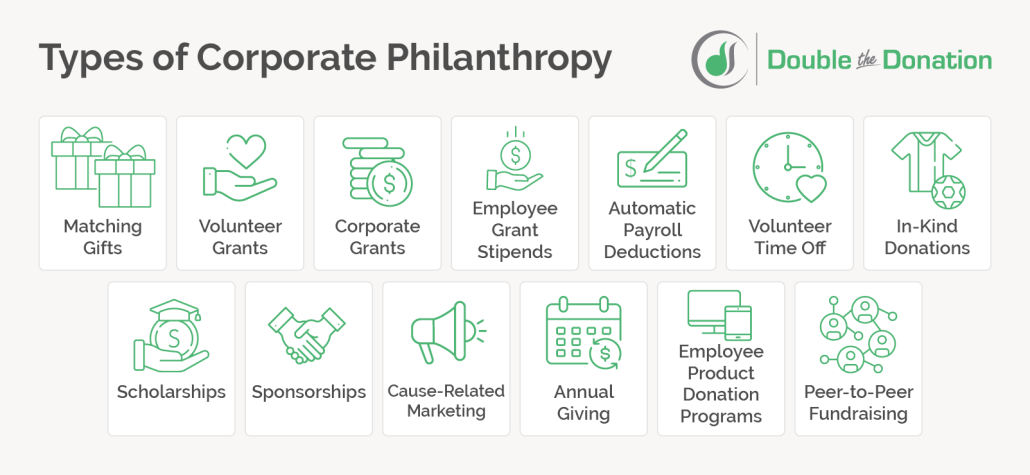Why more companies to invest in corporate philanthropy now more than ever
Checking Out Just How Corporate Philanthropy Shapes Brand Track Record and Client Commitment
Company philanthropy significantly affects brand name online reputation and consumer loyalty. Companies that participate in genuine philanthropic campaigns often see a positive change in just how customers regard them. This positioning of values fosters trust fund and psychological connections with audiences. The performance of these kind initiatives can differ considerably. Recognizing what genuinely reverberates with customers is necessary for brands seeking to enhance their social impact and market position. What strategies will arise as important for future success?
The Development of Corporate Philanthropy
As businesses increasingly identify their duty in culture, the evolution of corporate philanthropy has actually changed from simple charitable contributions to a calculated component of brand name identification. At first, companies took part in philanthropy mostly for tax advantages or to enhance their public picture. In time, this strategy moved as stakeholders-- including financiers, employees, and clients-- demanded a much more genuine commitment to social duty.
Organizations began straightening their philanthropic campaigns with their core values and service objectives, resulting in even more thoughtful and impactful payments. This change has urged companies to invest in sustainable methods and area advancement, promoting a feeling of purpose that reverberates with customers.
Furthermore, technical advancements have facilitated transparency and involvement, allowing companies to display their kind efforts extra effectively. Corporate philanthropy has actually arised as an indispensable component of company method, with companies accepting the chance to positively affect culture while enhancing their total brand name narrative.
The Influence of Philanthropy on Brand Perception
While firms participate in kind initiatives to advertise social good, these initiatives greatly shape brand perception among customers. Business philanthropy can improve a brand name's image by associating it with favorable social effect and community participation. Customers commonly view brands that proactively join charitable tasks as more trustworthy and liable. This understanding can influence investing in choices, as consumers might like brands that demonstrate a dedication to social issues.

Structure Emotional Links Via Granting
Corporate philanthropy acts as a powerful tool for enhancing brand identity by linking business values with neighborhood requirements. With critical offering, firms can cultivate neighborhood interaction and develop common values that resonate with customers on a psychological degree. This strategy not just reinforces brand reputation however also develops long-term links in between organizations and their stakeholders.
Enhancing Brand Identity
They not just add to societal excellent however likewise forge much deeper psychological connections with their target markets when business engage in kind initiatives. By aligning their brand with philanthropic causes, firms boost their identity and signal values that reverberate with customers. This positioning creates a story that goes past services and products, welcoming consumers to participate in a common objective. As customers significantly prioritize purpose-driven brand names, business that actively engage in providing can distinguish themselves in a crowded market. Such campaigns promote a feeling of loyalty amongst clients that feel directly attached to the brand's values. Eventually, business philanthropy comes to be an essential device for enhancing brand name identity, cultivating lasting connections based upon shared ideas and psychological interaction.
Fostering Area Engagement
Countless studies suggest that business engaging in community-focused philanthropic efforts can significantly reinforce emotional links with their stakeholders. By spending in local tasks and supporting social reasons, businesses cultivate a feeling of belonging and trust fund within the community. This interaction cultivates a positive brand name image, as clients value firms that demonstrate genuine issue for social concerns. Employees frequently feel much more honored and determined to be connected with an organization that focuses on community welfare. Because of this, consumers are most likely to develop loyalty in the direction of brand names that actively add to meaningful causes. Ultimately, fostering community engagement through philanthropy not just improves brand track record however likewise develops long lasting emotional ties that profit both the community and the firm it serves.
Creating Shared Values
How can companies efficiently create common worths that resonate with their stakeholders? Companies can attain this by straightening their kind initiatives with their core objective and the interests of their communities. By taking part in efforts that deal with local demands, services cultivate psychological connections with consumers, boosting brand loyalty. Partnering with non-profits that reflect shared worths enhances the brand name's picture and shows commitment to social duty. In addition, transparent communication concerning these efforts permits stakeholders to see the tangible influence of their payments. Ultimately, by incorporating shared worths into their business philanthropy, companies not just improve their online reputations however also grow long lasting partnerships with customers, causing enhanced commitment and trust. This positioning is important in modern customer decision-making.
Case Studies: Successful Philanthropic Campaigns
Analyzing effective kind campaigns exposes numerous techniques that boost brand track record. Impactful area initiatives, ingenious collaboration versions, and long-term interaction approaches have shown efficient in cultivating favorable connections with customers. These situation research studies highlight the value of thoughtful click to read more corporate providing in accomplishing both social and organization objectives.
Impactful Community Initiatives
Numerous firms have successfully leveraged kind projects to boost their brand name reputation while making a significant effect in their neighborhoods. An innovation company released an electronic proficiency program in underserved communities, supplying training and resources that equipped local residents. This campaign not just added to neighborhood advancement but also positioned the firm as a socially liable leader. A significant food business executed a hunger alleviation project, partnering with regional nonprofits to distribute dishes to families in demand. This initiative enhanced community connections and promoted customer loyalty. Via these impactful efforts, business have demonstrated their dedication to social obligation, efficiently straightening their brand name values with the demands of the neighborhoods they serve, ultimately boosting their general reputation.
Cutting-edge Partnership Versions
The success of impactful neighborhood initiatives usually depends upon cutting-edge partnership models that bring with each other diverse stakeholders to resolve complicated social obstacles. Situation researches show how companies, non-profits, and government entities can collaborate successfully. An international firm partnered with a neighborhood non-profit to release an education program, pooling sources and proficiency to improve area literacy rates. One more instance involved a tech firm and a healthcare organization signing up with pressures to develop a telemedicine service for underserved populaces. These collaborations not just amplified the reach of humanitarian initiatives yet also strengthened the brands' reputations by aligning their missions with neighborhood demands. Inevitably, innovative partnership designs offer as a stimulant for purposeful adjustment and foster more powerful links between brands and their consumers.
Lasting Engagement Techniques

Measuring the ROI of Company Social Duty
As business significantly spend in company social duty (CSR) efforts, understanding the return on financial investment (ROI) related to these efforts comes to be crucial. Measuring ROI in CSR is complex, typically encompassing both quantitative and qualitative metrics. Monetary returns can be assessed via enhanced sales, boosted brand commitment, and improved staff member morale, which can bring about higher performance. Additionally, business may examine cost savings connected to lasting methods, such as lowered waste or energy intake.
Qualitatively, the impact of CSR on brand online reputation can be assessed via consumer understanding researches and social networks sentiment analysis. Studies can provide insights right into just how CSR activities influence client commitment and trust. Furthermore, benchmarking versus industry requirements can aid companies gauge their CSR efficiency. Eventually, an extensive check over here strategy to gauging ROI enables business to make educated choices concerning future CSR financial investments, straightening strategies with both financial performance and social impact
Consumer Expectations and Business Obligation
Progressively, customers anticipate business to run with a solid feeling of business duty, watching moral techniques as a requirement for brand name commitment. This shift in expectation reflects a growing awareness of social and environmental issues, leading customers to prefer brand names that line up with their values. Consumers are much more inclined to support firms that take part in clear methods, show sustainability, and contribute favorably to their communities.
Additionally, social media sites intensifies these expectations, allowing consumers to share their viewpoints and experiences rapidly. Brand names that stop working to meet these honest standards take the chance of backlash, while those that welcome business responsibility usually delight in superior track record and customer commitment. As consumers demand liability, business have to incorporate corporate social responsibility into their core strategies, prioritizing moral behavior not equally as an advertising approach, but as an essential aspect of their procedures. This positioning can inevitably lead to more powerful brand name affinity and sustained success in affordable markets.
Future Trends in Business Philanthropy and Brand Name Commitment
The landscape of corporate philanthropy is evolving, affected by the intense consumer expectations bordering company responsibility. Business are progressively incorporating social impact into their core business strategies, not simply as a secondary task. Future trends indicate a important link shift toward openness, with brand names sharing thorough information about their humanitarian efforts and their direct effects on neighborhoods.
Technology is playing a crucial role, making it possible for real-time involvement between brands and consumers. Social media site platforms assist in straight interaction, permitting consumers to articulate their expectations and hold brand names liable. In addition, more youthful generations, specifically Millennials and Gen Z, prioritize sustainability and honest methods, driving organizations to take on more conscientious strategies.
As company philanthropy comes to be identified with brand name identity, companies that authentically align their goals with social requirements are likely to foster more powerful client loyalty. This convergence of values will ultimately form the future of business track record and consumer relationships in a significantly diligent marketplace.
Regularly Asked Inquiries
Just How Do Customers Discover a Business's Philanthropic Efforts?
Customers find a company's kind efforts via different channels, consisting of social networks, press releases, neighborhood events, and word-of-mouth. These avenues facilitate recognition, allowing people to engage with brand names that line up with their interests and worths.
What Role Does Staff Member Participation Play in Corporate Philanthropy?
Staff member involvement in company philanthropy enhances involvement, fosters a feeling of ownership, and enhances group communication - corporate philanthropy. This involvement often magnifies the impact of philanthropic campaigns, resulting in better awareness and support for the firm's philanthropic efforts
Can Corporate Philanthropy Backfire on a Brand name's Track record?
Corporate philanthropy can certainly backfire on a brand name's reputation if viewed as opportunistic or insincere. Unfavorable public assumption may develop, leading to decreased depend on and commitment amongst customers who prioritize authenticity in business activities.
Are Smaller Sized Firms as Reliable in Philanthropy as Larger Firms?
Smaller sized firms can be equally effective in philanthropy as larger corporations, typically showing dexterity and credibility. Their local initiatives might reverberate more deeply with communities, fostering genuine connections despite limited sources contrasted to their bigger equivalents.
Just How Can Firms Select the Right Triggers to Support?
Firms can pick the appropriate reasons by straightening their values with neighborhood requirements, evaluating stakeholder interests, and assessing potential impact. This strategic strategy fosters authenticity, boosts involvement, and enhances connections with customers and the broader area.
While firms engage in philanthropic initiatives to advertise social great, these initiatives significantly shape brand name assumption among consumers. As customers progressively prioritize purpose-driven brand names, business that actively involve in providing can distinguish themselves in a crowded market. Many firms have effectively leveraged philanthropic projects to improve their brand online reputation while making a significant impact in their areas. Progressively, consumers anticipate companies to run with a solid sense of corporate responsibility, seeing ethical techniques as a prerequisite for brand name loyalty. As company philanthropy ends up being identified with brand identity, firms that authentically straighten their missions with social needs are most likely to foster stronger consumer loyalty.